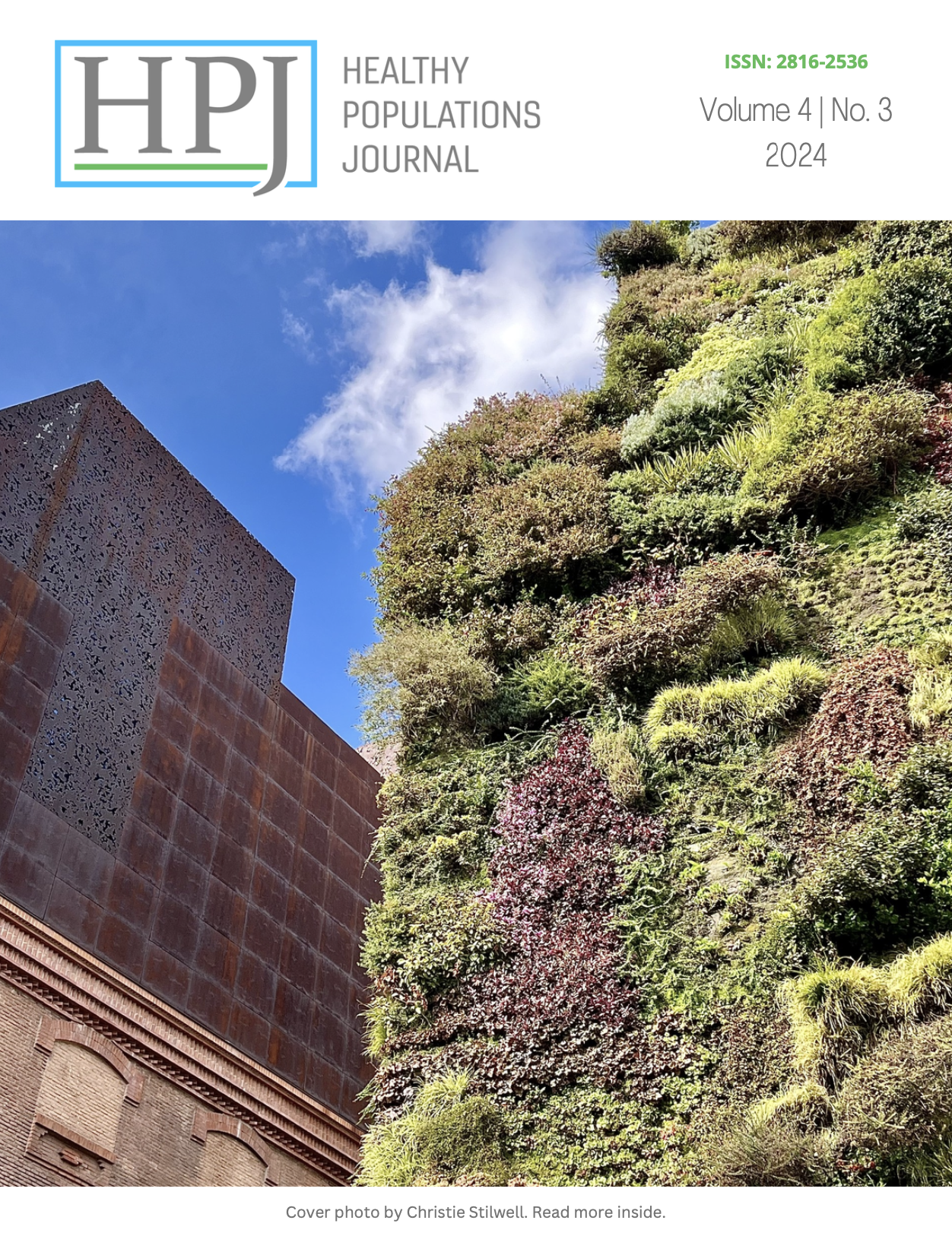Community-Based Doula Training: A Promising Practice for Improving Black Maternal Health
DOI:
https://doi.org/10.15273/hpj.v4i3.12033Palavras-chave:
Health Equity, women's health, health promotionResumo
Introduction: This paper presents findings from an evaluation of the novel community-based Black Postpartum Doula Training pilot project in Regent Park, Toronto. Rooted in the urgent need to address health care disparities and improve maternal outcomes, this initiative seeks to empower Black women to become doulas, health care leaders, and advocates within their own communities. Methods: Analysis of training participant interviews revealed several key themes. This pilot contributes to the growing body of evidence supporting the value of doula care in addressing health disparities, especially among marginalized communities. Results: It emphasizes the potential of targeted doula training programs as promising practices for promoting health equity in maternal care. These findings hold implications for future practice, highlighting the role of doulas in combating anti-Black racism and driving structural change in maternal health care. Conclusion: The paper underscores the significance of culturally competent care, advocacy, and self-care in enhancing maternal health outcomes and advancing health equity.
Referências
Campbell-Voytal, K., Fry McComish, J., Visger, J. M., Rowland, C. A., & Kelleher, J. (2011). Postpartum doulas: Motivations and perceptions of practice. Midwifery, 27(6), e214–e221. https://doi.org/10.1016/j.midw.2010.09.006
Chen, A. (2022, November 14). Current state of doula Medicaid implementation efforts in November 2022. National Health Law Program. https://healthlaw.org/current-state-of-doula-medicaid-implementation-efforts-in-november-2022
Cidro, J., Doenmez, C., Phanlouvong, A., & Fontaine, A. (2018). Being a good relative: Indigenous doulas reclaiming cultural knowledge to improve health and birth outcomes in Manitoba. Frontiers in Women’s Health, 3(4). https://doi.org/10.15761/FWH.1000157
Doenmez, C. F. T., Cidro, J., Sinclair, S., Hayward, A., Wodtke, L., & Nychuk, A. (2022). Heart work: Indigenous doulas responding to challenges of Western systems and revitalizing Indigenous birthing care in Canada. BMC Pregnancy and Childbirth, 22, Article 41. https://doi.org/10.1186/s12884-021-04333-z
Eidelman, G., Forman, K., Hachard, T., & Slack, E. (Eds.). (2022, November 17). The municipal role in public health (Who Does What Series). Institute on Municipal Finance and Governance. https://tspace.library.utoronto.ca/handle/1807/125715
Hamilton, N., Stevens, N., Lillis, T., & Adams, N. (2018). The fourth trimester: Toward improved postpartum health and healthcare of mothers and their families in the United States. Journal of Behavioral Medicine, 41(5), 571–576. https://doi.org/10.1007/s10865-018-9969-9
Miao, Q., Guo, Y., Erwin, E., Sharif, F., Berhe, M., Wen, S. W., & Walker, M. (2022). Racial variations of adverse perinatal outcomes: A population-based retrospective cohort study in Ontario, Canada. PLOS ONE, 17(6), Article e0269158. https://doi.org/10.1371/journal.pone.0269158
Ontario Health. (2023). A Black health plan for Ontario: A call to action to reduce health disparities and advance equity in Ontario. https://www.ontariohealth.ca/sites/ontariohealth/files/2023-06/BlackHealthPlan.pdf
Ottley, A., Taghavi Motlagh, S., Chung, E. G, Yang, Z., Haseeb, M. K, & Gilka, N. (2023). Black doulas: Bridging gaps in maternal support. The Pamoja Institute for Community Engagement and Action.
Paynter, M., Matheson, L., McVicar, L., Jefferies, K., Gebre, K., Marshall, P., Thomas, L., Zylstra, G., MacEachern, D., & Palliser‐Nicholas, F. (2022). Peer doula support training for Black and Indigenous groups in Nova Scotia, Canada: A community‐based qualitative study. Public Health Nursing, 39(1), 135–145. https://doi.org/10.1111/phn.12955
Sayyad, A., Lindsey, A., Narasimhan, S., Turner, D., Shah, P., Lindberg, K., & Mosley, E. A. (2023). “We really are seeing racism in the hospitals”: Racial identity, racism, and doula care for diverse populations in Georgia. PLOS ONE, 18(6), Article e0286663. https://doi.org/10.1371/journal.pone.0286663
Spiby, H., Green, J. M., Darwin, Z., Willmot, H., Knox, D., McLeish, J., & Smith, M. (2015). Multisite implementation of trained volunteer doula support for disadvantaged childbearing women: A mixed-methods evaluation. Health Services and Delivery Research, 3(8). https://doi.org/10.3310/hsdr03080
Stanley, D., Sata, N., Oparah, J. C., & McLemore, M. R. (2015). Evaluation of the East Bay Community Birth Support Project, a community- based program to decrease recidivism in previously incarcerated women. Journal of Obstetric, Gynecologic & Neonatal Nursing, 44(6), 743–750. https://doi.org/10.1111/1552-6909.12760
Thomas, K., Quist, S., Peprah, S., Riley, K., Mittal, P. C., & Nguyen, B. T. (2023). The experiences of Black community‐based doulas as they mitigate systems of racism: A qualitative study. Journal of Midwifery & Women’s Health, 68(4), 466–472. https://doi.org/10.1111/jmwh.13493
Toronto Public Health. (2024). Toronto Public Health’s strategic plan 2024–2028. https://www.toronto.ca/wp-content/uploads/2024/07/904d-TorontoPublicHealthStrategicPlan2024-2028.pdf
Publicado
Edição
Secção
Licença
Direitos de Autor (c) 2024 Amanda Ottley, Sara Taghavi Motlagh, Eu Gene Chung , Zhen Yang, Maarib Kirmani Haseeb , Nadija Gilka

Este trabalho encontra-se publicado com a Creative Commons Atribuição-NãoComercial 4.0.
The journal aims to reduce barriers to publishing and sharing research and inequalities to accessing information.This journal provides immediate open access to its content on the principle that making research freely available to the public supports a greater global exchange of knowledge. The open-access nature of the journal means that there will be no charge for authors or readers to use the journal. The journal has a Creative Commons Attribution Non-Commercial (CCBYNC) attribution which allows the author (and others) to share and distribute their full-text article in other public domains, such as Google Scholar or Research Gate.

